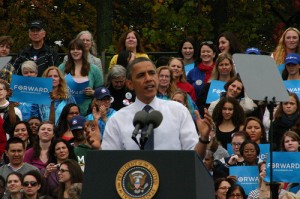Now that the presidential election is over, and the dust has settled a bit, we are left to speculate about what the next four years will bring. Whether or not you supported President Obama, it is hard to deny the uncertainty that still reigns supreme. There is much ado about fiscal policy, about staggering national debt, about income inequality, about homeland security, about natural disasters, about the world economy, and our ability as a individuals and as a nation to cope with it all.
 For the owners of America’s smallest businesses, this chronic uncertainty has been bleeding into daily operations and management mindset, making an indelible impression on overall optimism and economic outlook, and in short, has changed the way small business owners do business.
For the owners of America’s smallest businesses, this chronic uncertainty has been bleeding into daily operations and management mindset, making an indelible impression on overall optimism and economic outlook, and in short, has changed the way small business owners do business.
Has anything changed now that the presidency has been set? Here is a rundown of some of the key issues affecting small business owners:
- Obama’s re-election took away the uncertainty over The Affordable Care Act or “Obamacare” as it’s called, the President’s auspicious healthcare overhaul which is set to go into effect in 2014. It’s a legislative reality that business owners with 50 or more employees are going to have to deal with. (Businesses with fewer than 50 employees are exempt.) But, how all these changes will affect the healthcare industry “at the ground level” is still unclear, and even with all the checks in place, healthcare could still end up costing small business owners more.
- The election process only deepened the partisan divide over taxes and fiscal policy. At issue is the imposing fiscal cliff, which is slated to go into effect in January 2013, barring any Congressional action. Going over the cliff will mean some $7 trillion worth of hard to swallow tax increases and spending cuts over the next decade. Here’s a brief summary of some of the key changes:
-Several Bush-era tax breaks are set to expire resulting in a 3 percent increase on individual income tax rates in 2013. Those making more than $388,350 a year, will see a 4.6 percent increase.
-Payroll taxes will increase to 6.2 percent from 4.2 percent. This will be particularly hard for small business owners who are both owners and employees of their businesses.
-The tax break for capital purchases will end. Under Section 179, if you purchased equipment for your business this year, you can deduct half the cost on your taxes right away and it counts as depreciation. In 2013, the depreciation rules will revert to their normal setup allowing you to only deduct the cost of equipment gradually, over the life of the asset.
-The Alternative Minimum Tax (AMT) may tax many middle class Americans, including small businesses. The intention of the AMT is to prevent wealthy individuals from using numerous deductions to significantly drive down their tax obligations so that they are effectively paying too little. But the threshold for those who are subject to the AMT is currently set at $150,000, an amount that will likely affect many middle class workers and small business owners. AMT also affects LLCs, partnerships, and S Corporations.
- Obama’s re-election also ensures a continuation of quantitative easing- the Federal Reserve’s attempt at reviving the economy by artificially keeping interest rates exceptionally low. Why is this important to small business owners? The critics of quantitative easing, which are not surprisingly significantly Republican, point out that these policies have not helped the economy. Which ever way you hold, the Fed’s moves have an impact on inflation and the overall strength of the dollar- and that is something that can affect many small businesses, especially those who are involved in global purchasing or sales.
In short, though the question of who the next president will be has been answered, there still remain enough questions to keep small business owners” busy” for a while to come.
